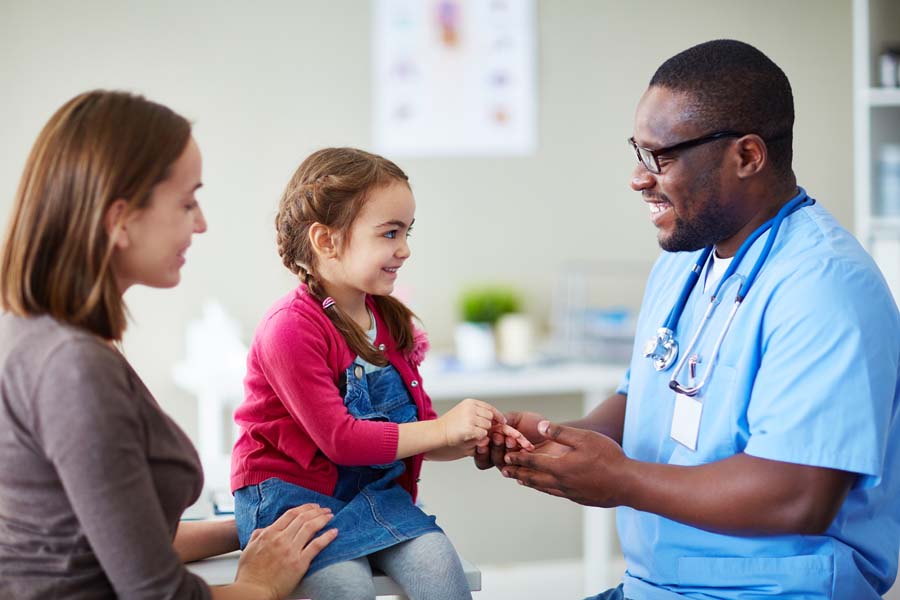The four-year-old boy was in trouble. He was severely obese. He still drank from a bottle. He was prone to throwing tantrums when his parents denied him junk food. But that changed after Sharon Weston intervened.
Weston, a clinical dietitian at Boston Children’s at Peabody, is in charge of Optimal Weight for Life (OWL), the hospital’s after-school program devoted to helping obese children and their families develop healthy diet and exercise habits. After two years of monthly one-hour meetings attended by the boy and his parents, everything turned around. The boy’s body mass index fell within a normal range, he stopped drinking from a bottle, his outbursts ceased, and he joyfully ate a variety of healthful foods. Just as important, his parents followed suit, role-modeling good eating habits and building grocery lists around an abundance of fruits and vegetables instead of sugary calorie bombs. “The entire family took to heart the messages we were teaching them,” Weston says.

Boston Children’s at Peabody, a fixture since 1995, has quietly engaged in a slate of outreach efforts throughout the North Shore. Whether through nutrition and exercise counseling, bullying prevention, partnering with local schools, or hosting the annual Winter Wonderland—a holiday open house that drew an audience of more than 600 last year, along with 82 volunteers from local businesses—the organization has had an impact on the well-being of area children (and their families) that goes beyond those who walk through their doors at 10 Centennial Drive in Peabody.
“They go all out to love people in the community—not just their patients,” says Bonnie Merriam, a Danvers resident who attended the most recent Winter Wonderland event with her four children, three of whom have visited Boston Children’s at Peabody as patients. “They’ve done a great job of making kids feel special, especially at the holiday event.”

Boston Children’s at Peabody, one of the hospital’s five main campuses in the Commonwealth, is a 40,000-square-foot facility housing an array of radiology, ultrasound, MRI, and X-ray technology, as well as more than 100 healthcare providers, most of whom split their time between Peabody and the flagship facility on Longwood Avenue in Boston. “A family might come in from Danvers for an appointment, and the next patient in line is somebody who came from Kuwait or the Virgin Islands,” says Nicolas D’Onofrio, administrator at the Peabody campus. “We see that all the time at [the hospital on] Longwood, but to see it here in Peabody brings it into perspective: Families will travel anywhere they need to for their kids’ care, and what a blessing and a gift for North Shore families to have it so close to home. They can come here, right off the highway, and get world-class patient- and family-centered care.”
In recent years, Boston Children’s at Peabody has branched into other communities across the North Shore. The clinic has helped staff the student health center at Peabody High School, leading to a partnership with the school’s student advisory board, and sent a delegation to the school’s career fair. To ease the burden on local police and fire departments, Boston Children’s at Peabody has a nationally certified technician to handle children’s car seat installations. The clinic’s lobby features a rotating exhibition from Express Yourself, a youth arts organization based in Beverly. D’Onofrio is a regular at local chamber of commerce and American Red Cross meetings. “The spirit and the amount of love that the city of Peabody has—the city, the businesses, the community at large—is amazing,” D’Onofrio says.

Among the most important initiatives, Dr. Peter Raffalli, a neurologist at Boston Children’s Hospital and the director of the Bullying and Cyberbullying Prevention and Advocacy Collaborative, leads a town hall–style presentation for summer campers at the Peabody YMCA each year. The gist of the presentation involves identifying the true nature of bullying (“It’s important that kids know that it’s more than just name-calling,” Raffalli says), giving students a chance to share their own stories and concerns, and finding ways to address the phenomenon. The free-form talks augment the anti-bullying education students have already received, which is a credit to their schools’ and communities’ investment in curbing bullying and its far-reaching effects, Raffalli says. “There are always going to be some kids who are callous to (bullying), but with the grand majority of kids I talk to, they listen, they make eye contact, they raise their hands, and they want to contribute. Compared to 10 years ago or more, we’re definitely seeing an increased awareness and sensitivity.”
Elsewhere, the OWL program, a new iteration of the hospital’s diet and exercise outreach initiatives led by Weston, is intended for children with a body mass index above the 95th percentile, whose obesity corresponds with a heightened risk for diabetes, hypertension, depression, fatty liver disease, sleep apnea, and other medical issues. Weston’s nutritional approach emphasizes three balanced meals a day—half a plate of fruits and vegetables, a quarter plate of low-glycemic carbohydrates, and the remainder made up of lean protein and healthy fats—along with snacks comprising low-glycemic carbohydrates and protein and minimally sugar-sweetened beverages. Each monthly session includes a cooking lesson—usually preparing a nonstarchy vegetable—and the program involves specialists in behavioral medicine and endocrinology.
Another nutritional outreach initiative involved teaching nutrition lessons in Beverly’s elementary schools, which Weston says significantly improved students’ understanding of basic nutrition. Additionally, a grant from the Centers for Disease Control allowed funding to install salad bars in Beverly’s elementary schools, fostering an environment that takes the fear out of trying a variety of fruits and vegetables for the first time. “If everyone in the room is offered kale chips, and your friends sitting next to you are eating them, you’re more willing to try them,” Weston says.
While these outreach efforts run the gamut, they all share a common aim: showing that Boston Children’s at Peabody can strengthen the well-being of the North Shore during good times and help during difficult moments. “We’re trying to make sure we are what we say we are,” says D’Onofrio. “We care about the community from a medical standpoint without a doubt, but we care from a relationship side as well. These events and programs show the hospital through a different lens, and show that fun and happiness can occur within our walls.”

